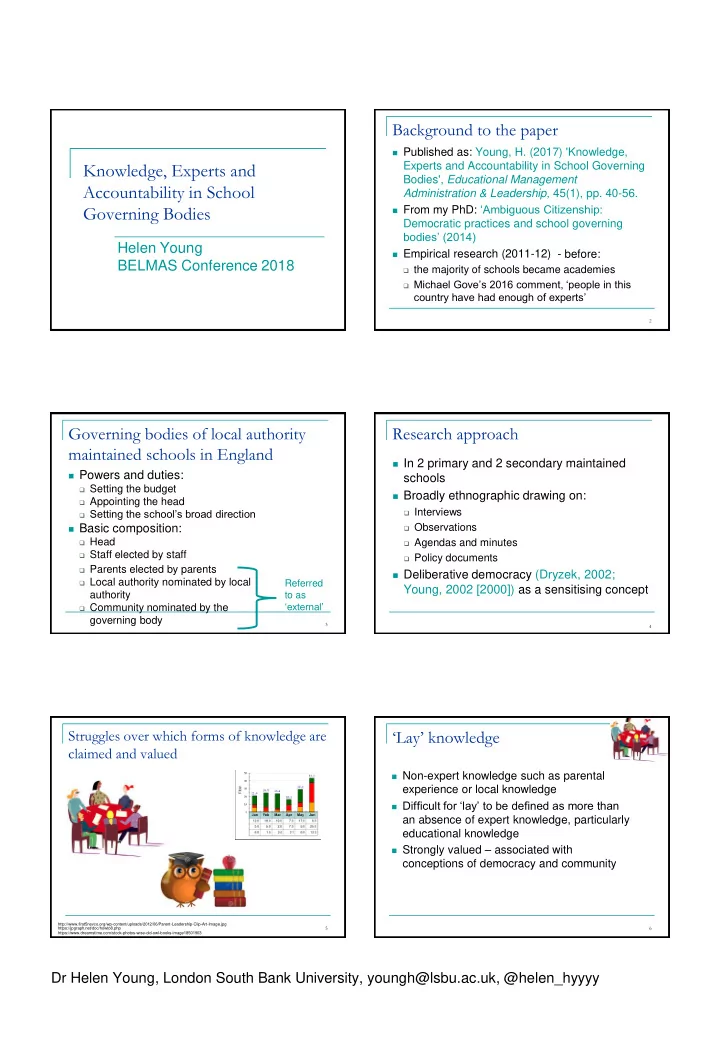

Background to the paper Published as: Young, H. (2017) 'Knowledge, Knowledge, Experts and Experts and Accountability in School Governing Bodies', Educational Management Accountability in School Administration & Leadership, 45(1), pp. 40-56. Governing Bodies From my PhD: ‘Ambiguous Citizenship: Democratic practices and school governing bodies’ (2014) Helen Young Empirical research (2011-12) - before: BELMAS Conference 2018 the majority of schools became academies Michael Gove’s 2016 comment, ‘people in this country have had enough of experts’ 2 Governing bodies of local authority Research approach maintained schools in England In 2 primary and 2 secondary maintained Powers and duties: schools Setting the budget Broadly ethnographic drawing on: Appointing the head Setting the school’s broad direction Interviews Observations Basic composition: Head Agendas and minutes Staff elected by staff Policy documents Parents elected by parents Deliberative democracy (Dryzek, 2002; Local authority nominated by local Referred Young, 2002 [2000]) as a sensitising concept authority to as ‘external’ Community nominated by the governing body 3 4 Struggles over which forms of knowledge are ‘Lay’ knowledge claimed and valued Non-expert knowledge such as parental experience or local knowledge Difficult for ‘lay’ to be defined as more than an absence of expert knowledge, particularly educational knowledge Strongly valued – associated with conceptions of democracy and community http://www.first5nevco.org/wp-content/uploads/2012/06/Parent-Leadership-Clip-Art-Image.jpg https://jpgraph.net/doc/howto8.php 5 6 https://www.dreamstime.com/stock-photos-wise-old-owl-books-image18501903 Dr Helen Young, London South Bank University, youngh@lsbu.ac.uk, @helen_hyyyy
‘Lay’ has positive connotations Expert knowledge constitutes objects Expert knowledge is powerful ‘Governors are … lay people and their strength has It constitutes objects such as ‘good education’ always been seen in these terms’ or ‘performance’ (Creese and Earley, 1999: 71) ‘expert knowledges give rise to much of what ‘the most important thing is obviously a love for … we “say” and “see” or the objects that we take education. And also a sense of commitment. And a to exist in the world and how we talk about head full of common sense . That is all you need. them’ (Walter, 2008: 540) Because at the end of the day anybody [can] Ball’s ‘performativity’ (2006 [2003]) shows how understand hopefully, what is right and what is not (managerial) knowledge constitutes ‘good’ right’ (Chaman, community governor and chair, Tyne Secondary) education and the role of teachers 7 8 Educational knowledge Discourse of derision of educational knowledge Educational knowledge is a form of expertise ‘discourse of the valuing of Its boundaries are fuzzy derision’ (Ball, external External governors frequently made claims to governors with 2006 [1990]) educational knowledge - from work in other lay knowledge of professional schools or from Ofsted reports etc educational They tended to draw on any educational knowledge knowledge they had – suggesting it was valued 9 10 Managerial knowledge Education as an auditable product transferable seen as coming from business ‘The powers once accorded to positive There is an emphasis on aspects of education knowledges of human conduct are to be which can be measured transferred to the calculative regimes of Education becomes ‘intelligible’, through data accounting and financial management’ analysis, to those with managerial knowledge (Rose, 2005 [1996]: 54) 11 12 Dr Helen Young, London South Bank University, youngh@lsbu.ac.uk, @helen_hyyyy
Struggles over which forms of knowledge are Struggles over which forms of knowledge are claimed and valued claimed and valued http://www.first5nevco.org/wp-content/uploads/2012/06/Parent-Leadership-Clip-Art-Image.jpg http://www.first5nevco.org/wp-content/uploads/2012/06/Parent-Leadership-Clip-Art-Image.jpg 13 14 https://jpgraph.net/doc/howto8.php https://jpgraph.net/doc/howto8.php https://www.dreamstime.com/stock-photos-wise-old-owl-books-image18501903 https://www.dreamstime.com/stock-photos-wise-old-owl-books-image18501903 References Ball SJ. (2006 [1990]) The New Right and discourses of derision. In: Ball SJ (ed) Education policy and social class: The selected works of Stephen J. Thank you! Ball. London: Routledge, 26-42. Ball SJ. (2006 [2003]) The teacher's soul and the terrors of performativity. In: Ball SJ (ed) Education policy and social class: The selected works of Stephen J. Ball. London: Routledge, 143-156. Biesta G. (2004) Education, accountability, and the ethical demand: Can the democratic potential of accountability be regained? Educational theory 54: 233-250. Creese M and Earley P. (1999) Improving schools and governing bodies: Helen Young Making a difference, London; New York: Routledge. London South Bank University DfE. (2014a) The constitution of governing bodies of maintained schools: Statutory guidance for governing bodies of maintained schools and local youngh@lsbu.ac.uk authorities in England, May 2014. London: DfE. DfE. (2014b) Governors’ Handbook: For governors in maintained schools, @helen_hyyyy academies and free schools. HMSO. 15 16 References References Young, H. (2015) 'Asking the ‘right’ questions: the constitution of school Dryzek J. (2002) Deliberative democracy and beyond: Liberals, critics, contestations, USA: Oxford University Press. governing bodies as apolitical', Journal of Education Policy, 31(2), pp. 161- 177. Ofsted. (2011) School governance: Learning from the best, London: Ofsted. Young, H. (2017a) 'Busy yet passive: (non-)decision-making in school Olssen M, Codd J and O'Neill A-M. (2004) Education policy: Globalization, governing bodies', British Journal of Sociology of Education, 38(6), pp. 812- citizenship and democracy, London: Sage. 826. Rose N. (2005 [1996]) Governing "advanced" liberal democracies. In: Barry Young, H. (2017b) 'Knowledge, Experts and Accountability in School A, Vincent C and Braun A. (2011) I think a lot of it is common sense.…’: Governing Bodies', Educational Management Administration & Leadership, Early years students, professionalism and the development of a ‘vocational 45(1), pp. 40-56. habitus'. Journal of Education Policy 26: 771-785. Young IM. (2002 [2000]) Inclusion and Democracy, London: Oxford Walter R. (2008) Foucault and radical deliberative democracy. Australian University Press. Journal of Political Science 43: 531-546. Young H. (2014) Ambiguous Citizenship: Democratic practices and school governing bodies Humanities and Social Science. Institute of Education, London. 17 18 Dr Helen Young, London South Bank University, youngh@lsbu.ac.uk, @helen_hyyyy
Recommend
More recommend